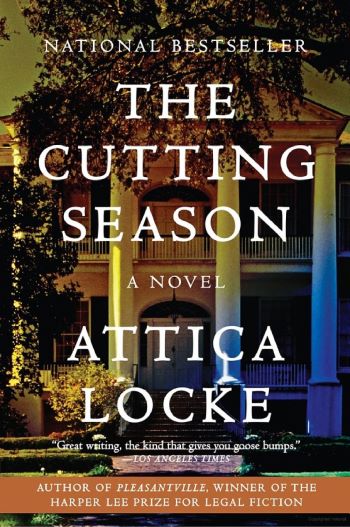Sitting on the banks of the Mississippi river, Belle Vie has everything one could want in a southern plantation turned historic site and venue: an opulent big house, beautifully groomed grounds, and an unsettling past. But when the body of a migrant worker is found in one of the enslaved workers’ cabins, the present proves just as challenging.
At the center of Locke’s The Cutting Season and Belle Vie’s history is Caren Gray, the venue’s manager and live-in caretaker. Raised on the grounds and descended from the enslaved people who once worked the land, Caren has conflicted ties to the location and to Belle Vie’s owners, the Clancy family. The murder of Inés Avalo may drive the plot forward, but the story circles primarily around Caren’s evolving relationship with place, family, and her own identity. Her involvement with her daughter Morgan echoes her own childhood bond with her mother, Helen; her interactions with the Clancy sons, Raymond and Bobby, taint her memories of their childhood friendship; and her solidarity with the venue’s other Black employees is curtailed by her own managerial position. Caren finds herself entangled in the murder investigation when one of the employees is arrested for Inés’s murder and Morgan begins acting oddly. Her personal life gets even more complicated when Morgan’s father, Eric, shows up at the same time that a reporter starts snooping around Belle Vie’s grounds and a rusty red pickup keeps appearing in her rear view mirror.
Locke’s central achievement in The Cutting Season is her layering of current social issues, like that of migrant labor in the South’s agriculture-dependent economy, over the historical problem of chattel slavery without ever turning heavy-handed or preachy. The parallels between the historically enslaved Black population and the migrant workers in the sugarcane fields become integral to the plot as Caren learns more about a historical death that occurred on the land – a murder that involved her own family. Locke’s characters demonstrate richly varied attitudes toward Belle Vie and its history, from pride and ownership in the achievements of their enslaved ancestors to horror at its memories of slavery.
This is one of my all-time favorite southern-set crime novels, and Locke is one of my favorite contemporary American crime writers. Her characters are complex, their interpersonal struggles are compelling, and the setting is immaculate. Many of the students found the novel’s denouement to be unsatisfying, but that sense of an open ending is also part of the novel’s engagement in messy contemporary problems surrounding identity and locale. While this novel doesn’t have the plotting complexity of her legal thrillers, Black Water Rising and Pleasantville, in its treatment of place – and people’s ties to place, even when it might not be in their best interest – The Cutting Season anticipates the successes of Locke’s more recent Darren Matthews novels. If mysteries where the setting is integral to the action are your jam, this novel is definitely for you.
Professor rating: 4.5 of 5 stars
Spring 2024 class rating: 3.9 of 5 stars

